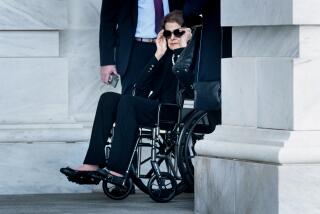Father’s Illness Keeps First Lady From Health Care Panel : Policy: Aides say they hope she will be able to attend the task force’s first public meeting. Colleagues say work on the reform plan has not stopped.
- Share via
WASHINGTON — As the health care reform task force she heads begins to move into the final phase of its work, Hillary Rodham Clinton continued her vigil Friday at the bedside of her ailing father in Little Rock, Ark.
White House aides said they hope that the First Lady will be able to return here by Sunday night, in time to preside over the first public meeting of the task force on Monday.
But they conceded that may not be possible, given uncertainty about the condition of Hugh Rodham, who remained in critical condition at St. Vincent’s Hospital a week after suffering a stroke at his home in Little Rock.
President Clinton visited the hospital last weekend, but his wife and daughter, Chelsea--whose Washington private school is on its spring break--have been in Little Rock since last week. They have been spending much of each day at the hospital along with the First Lady’s two brothers and her mother, Dorothy Rodham.
“I’m getting a very personal crash course on health care,” Hillary Clinton told one aide this week during a telephone conversation.
Aides would not speculate about the impact, if any, that the experience has had on her views of the health system. “It’s just inappropriate,” said her press secretary, Lisa Caputo.
“We haven’t talked to her much, but my guess is that the effect now would be minimal,” said another staff member. She is more likely to be influenced by the hundreds of stories she has heard during her public discussions of health policy from people talking about their own experiences, the aide said.
Nevertheless, the aide--and some outside health experts as well--confessed to being interested in seeing whether the First Lady’s sudden immersion in the world of high-tech medicine eventually will alter her views on issues such as expensive, high-intensity medical services or the need for insurance to provide long-term care.
“God works in mysterious ways, doesn’t he?” mused one prominent health care analyst and Clinton Administration adviser, who also is a friend of the Clintons. “This sure does make personal for Hillary what’s been just public policy.”
In the meantime, however, task force members said their leader’s absence has not slowed the work of the panel or its myriad working groups, and they insisted that they remain on track to meet an early May deadline for a completion of a health care plan.
“We’re on a schedule for this to pop out at a certain time regardless,” said Health and Human Services Secretary Donna Shalala, a close friend of Hillary Clinton who has presided over hearings on the health plan in her absence. “She’ll be back in time.”
The task force’s various working groups have been meeting around the clock for weeks to examine options on how to structure a new health care system, how to pay for it, how to expand access to health care to people without insurance and how to control the steadily rising national health care bill.
But in the next few days, the process will start to shift from working groups to decision-makers: the President and his top advisers, including the First Lady, senior White House aides Ira Magaziner and Robert E. Rubin, Council of Economic Advisers chief Laura D’Andrea Tyson and several other members of the Cabinet.
The President is expected to spend most of the next week preparing for his planned summit with Russian President Boris N. Yeltsin on April 3 and 4. Once Clinton returns from the summit, however, he and task force members are expected to begin several weeks of intensive meetings to craft the health reform plan, aides said.
“Those decisions have to be made over the next two to three weeks,” Shalala said.
Aides said the process will be similar to that which the President used to craft his economic plan last month--a marathon of meetings where he and his top advisers debate options.
But “the process will have to be crisper” this time around, Shalala said. In the weeks since the economic plan was crafted, foreign policy crises have begun taking an increasing amount of Clinton’s time. “Things are a lot busier now,” she said.
In a related development, the list of people working for the health care task force was officially made public. Many of the 511 names already have become public knowledge because of leaked lists.
White House officials had hoped to keep the makeup of the task force working groups a secret to shield members from pressure by special interest groups. They released the list after being criticized for being so secretive about the workings of the task force.
Most of those serving on working groups of the task force are government employees. Others are consultants or “special” government employees--people who work for the government for less than 130 days in any year, with or without pay.
More to Read
Get the L.A. Times Politics newsletter
Deeply reported insights into legislation, politics and policy from Sacramento, Washington and beyond. In your inbox twice per week.
You may occasionally receive promotional content from the Los Angeles Times.











